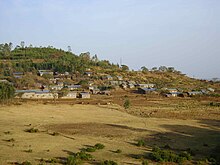Awra Amba
Awra Amba is a self-governing Ethiopian village in the province of Amhara , in which there are no religions , in which there is equality between women and men and in which all residents work together for the common good.
The place is 1900 m above sea level, 74 km away from Bahir Dar and around 630 km away from the state capital Addis Ababa .
history
The village was founded in 1980 by Zumra Nuru, who had previously advertised his ideas as an itinerant preacher in vain. He recruited 70 followers from an Alevi village and settled on a fallow land 2000 meters high. The first years were tough, but with the diligence of the residents, a modest prosperity developed in the village.
At the end of the 1980s, the Marxist regime wanted to arrest Zumra Nuru as a counter-revolutionary . He fled and the community broke up. After the fall of the communist regime in 1991, most of the residents returned and the village took off noticeably. A school for the children was built, an old people's home, a fabric factory with looms, a tailor's shop and a grain mill. Profits are shared among the villagers.
There are no churches or mosques in the village. Religious communities, religious rites and festivals are abolished. Zumra Nuru is illiterate . He believes that religions cause more harm than peace. In addition to the practice of religion, the consumption of alcohol is also prohibited. Anyone caught drinking alcohol a third time has to leave the village. Girls are only allowed to marry from the age of 18, men from the age of 22.
Today over 400 people live in the village and prosperity is increasing. Social researchers from all over the world visit the village. Awra Amba is viewed with skepticism, sometimes with hostility, by neighboring communities.
literature
- Uwe Buse: Communes: Without God and without booze . In: Der Spiegel . No. 9 , 2011, p. 54-57 ( online ).
- Sven Less, Michael Marek: Lived utopia in Awra Amba , Deutschlandfunk, day by day, broadcast on July 16, 2019 (accessed on July 16, 2019)
Web links
- Homepage of the place
- Awra Amba, an Ethiopian utopia , article by Robert Joumard on the attac website , September 28, 2010
Coordinates: 11 ° 50 ' N , 37 ° 45' E






